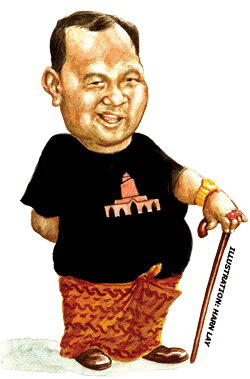Magazine
COVER STORY
The Faces of Burma 2005
By The Irrawaddy
DECEMBER, 2005 - VOLUME 13 NO.12
(Page 12 of 13)
Tension between the commander and Shan groups rose with the detention of Maj-Gen Sao Hso Ten, president of the Shan State Peace Council, on charges of treason.
Like his mentor, Maung Aye, Myint Hlaing is not a fan of ceasefire groups retaining their weapons and has a history of intimidating factions into surrendering arms, notably the Palaung State Liberation Organization and some divisions of the Shan State National Army and Shan State Army-North.
The junta proved its support of Myint Hlaing with the 106-year prison sentence handed to Sao Hso Ten in late November, and the hardline commander is being tipped for promotion in the next military reshuffle.
Daw Thissawaddy [Burmese Female Monk]
Daw Thissawaddy made headlines in July 2005 when she was arrested by Burmese authorities during a visit to Rangoon.
 Prior to her arrest, Daw Thissawaddy, 41, was a PhD candidate in religious philosophy in Sri Lanka, where she also received her ordination as a female monk, or bikkhuni, a common practice in the Sri Lankan tradition of Theravada Buddhism.
Prior to her arrest, Daw Thissawaddy, 41, was a PhD candidate in religious philosophy in Sri Lanka, where she also received her ordination as a female monk, or bikkhuni, a common practice in the Sri Lankan tradition of Theravada Buddhism.The practice of ordaining female monks no longer exists in Theravada Buddhism as practiced in Burma. In past centuries, however, the bikkuni sangha, or Order of Ordained Nuns, was a well-known and accepted feature of Buddhism.
Many scholars cite the date 456 AD to mark the decline of female ordination in Theravada Buddhism. However, inscriptions from the Pagan era (11th to 13th centuries) suggest the practice continued well beyond that date. According to the renowned scholar Than Tun (one of The Irrawaddy’s People of 2003), Burma’s female monks were venerated as highly as their male counterparts.
Several attempts have been made to reinstate the practice in the 20th century, most notably by Abbot Shin Adicca; all such efforts, however, have failed. Burma’s current military rulers view the issue of bikkhuni ordination as a criminal offense punishable by lengthy prison terms.
Prior to her arrest, Daw Thissawaddy had petitioned Burma’s Sangha Nayaka, the ruling council of the country’s monastic community, to reinstate female ordination, claiming that historical precedents supported such a move. The council dismissed her request and charged her with attempting to cause dissent among Burmese women. Burma’s ruling junta took a similar view.
Daw Thissawaddy was arrested in Rangoon on May 27, 2005. She had remained in Burma following the World Buddhist Summit in December 2004, to tend to her ailing father. Authorities charged her with abuse of religion and desecration of religious buildings, according to a report by Radio Free Asia, who broke the story of her arrest.
During her incarceration, Daw Thissawaddy refused all attempts by authorities to coerce her to stop promoting female ordination in Burma, though denying her convictions and apologizing would have secured her release. The regime finally relented some 3 months later, and allowed her to return to Sri Lanka, claiming that they had arrested her by mistake.
Daw Thissawaddy and her fellow bikkhunis dismiss claims that their efforts are politically motivated, and they admit that the debate over female ordination in Burma could never be resolved without substantial reforms of the country’s practice of Buddhism. But the debate is part of the larger issue of religious freedom.
Tay Za [Businessman]
Burma may be a poor country, but wealthy businessmen have little to complain about.
 Tay Za, a 41-year-old tycoon, is one of them. And he is still going strong.
Tay Za, a 41-year-old tycoon, is one of them. And he is still going strong.As a symbol of his wealth, the young businessman now enjoys driving an expensive American-made Hummer, the civilian version of the military Humvee, on Rangoon roads.
Local publications were not allowed to carry stories about Tay Za’s new vehicle. Burma’s notorious censor board axed the Hummer story. There is no clear answer why, but business sources and well-informed editors in Rangoon say Tay Za was one of only two in the country who bought Hummers, the other being regime supremo Snr-Gen Than Shwe’s son, Kyaing San Shwe. Therefore, such a story with a link to Burma’s first family would be sensitive.
Indeed, the young tycoon’s close ties to Than Shwe’s family remain the talk of the town. He is also close to family members of some other high-ranking officials. But his business links with Than Shwe and others in the upper echelons, in particular, have been carefully watched by some rival groups, notably by junta number two Deputy Snr-Gen Maung Aye, according to military sources.
Late this year, Tay Za’s office was randomly searched, and he was rumored to have been taken for interrogation, presumably without Than Shwe’s go-ahead. Business sources and political observers are now saying that if Than Shwe retires, Tay Za and his company’s future are uncertain. Company sources say he and his family feel uneasy about being associated with Than Shwe’s family.
Tay Za is president and managing director of the Htoo Trading Company, a major player in a wide area of Burmese business and industrial activities, ranging from the hotel and tourism trade to arms imports.
Htoo Trading is involved in timber, transport, tourism, construction, property development, palm oil production and arms deals. This year he set up his own domestic airline, Air Bagan. As the list of his company’s interests has grown impressively, so has its earnings.
« previous 1 | 2 | 3 | 4 | 5 | 6 | 7 | 8 | 9 | 10 | 11 | 12 | 13 next page »
more articles in this section
